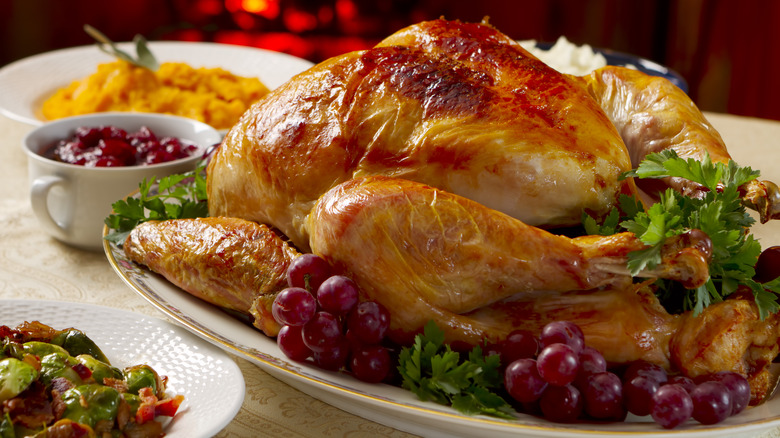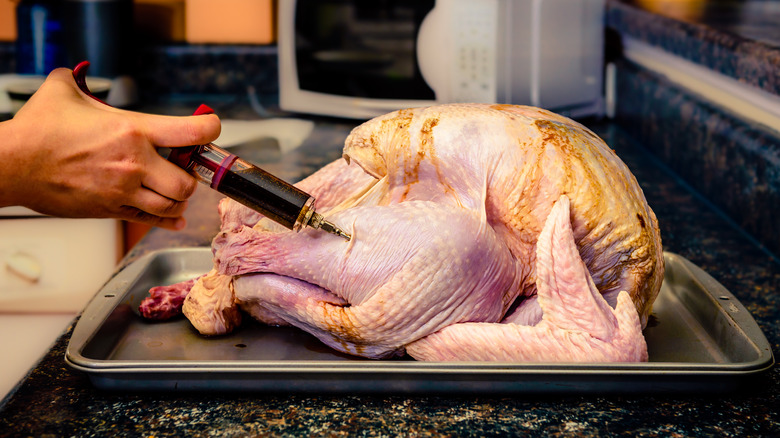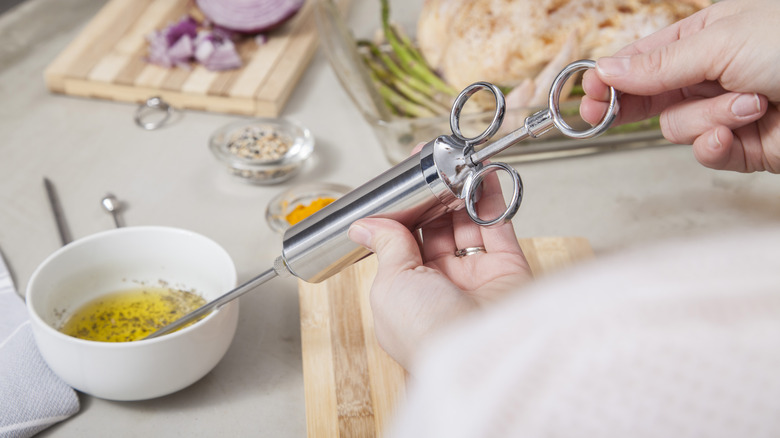How To Inject Your Turkey With Marinade For Juicy Tender Meat
Prepping a turkey isn't so much time consuming as it is consuming valuable refrigerator space. Brines and dry rubs are great but they need time to do their job — at least 48 hours for just the salt to get into the meat, according to some sources. When finding the best time to season meat, you should allow a marinade at least an hour per pound of meat. That's a long time for a large bird. If you don't have that kind of time or refrigerator space, using a meat injector might just be the way to get a moist, flavorful bird quickly.
Injecting your meat with marinade works the same way a regular marinade or brine would, but with less time spent waiting for the marinade to do its job. It's also a great way to get flavor and moisture deep within the bird where marinades and rubs can't go. Moreover, this method can help to keep the turkey moist during a long roast in the oven. Instead of something you need to soak in gravy or cranberry sauce, take a few minutes to grab a meat injector, place marinade directly into the meat, and you'll have moist, flavorful turkey.
How to use your favorite marinades
A meat injector's long needle and hefty chamber is great for getting flavor — about two teaspoons per squeeze — deep into the turkey. If you were working with a rub, take your rub ingredients and turn them into a marinade with melted butter, a bit of chicken or turkey stock, oil, or vinegar. You can even inject your meat with beer.
If you're pairing injection with another flavoring method like a basic turkey brine, be aware of the total sodium amount, as you don't want to oversalt the turkey. Meanwhile, if you're going to use herbs and aromatics, make sure they're minced super fine so they don't clog the needle. A spice grinder should do the trick just nicely.
When working, space the injection points evenly around the bird and aim for the middle of the meat. As you push the plunger, slowly pull the needle out of the meat to avoid pockets of salty marinade. Don't be stingy, as the more injections you make, the juicier the meat will be.
After injecting the marinade, let the turkey rest for at least three hours. If there's little to no resting time the liquid won't have to chance to permeat the meat, so you'll risk biting into a salty piece of meat. With enough planning, this an ideal method if you need to roast your turkey the same day.
No meat injector? No problem
If you don't have a meat injector, don't fret. There are a few other methods of getting flavor and moisture into your turkey. For one, after preparing your turkey, pull back the skin and poke holes in the meat with a fork. This will create holes for the marinade to penetrate the meat. It won't be as deep as a meat injector, but it will bring flavor further into the meat than a marinade or rub alone would. A skewer will do the same and can get deeper than a fork. After you make your holes, pour your marinade over the turkey, or keep it in a brine solution until you're ready to cook.
If you're worried about the holes allowing juices flow out during cooking, don't. The moisture lost during cooking is negligible and shouldn't be enough to dry out your turkey. If you keep the temperature and timing just right, you'll still end up with moist, flavorful turkey.


